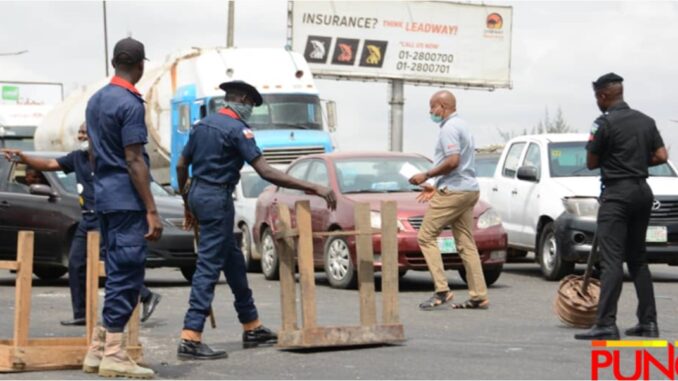
By the time he reinstated the free movement of essential services workers on Wednesday, amid nationwide travel restrictions and curfew, the Inspector-General of Police, Mohammed Adamu, and his officers had further sullied the image of the force and demoralised frontline personnel in the COVID-19 crisis. Though the IG has reversed himself, the confusion over his earlier alleged directive to his officers to strictly enforce the 8pm to 6am curfew and restrictions on inter-state travel that effectively countermanded the presidential exemptions had already provoked a strike by medical doctors and protests by other frontline workers.
Health workers are at the frontline of the COVID-19 outbreak response and as such are exposed to hazards that put them at risk of infection. They should be treated as such. The President, Major General Muhammadu Buhari (retd.), and the Presidential Task Force on COVID-19 need to forbid security personnel from harassing essential service workers, and severely punish the acts and perpetrators of corruption and abuse of rights in the name of enforcing regulations. A report said about 50 journalists and some health professionals were detained by police in Lagos for allegedly flouting the curfew.
The Nigeria Police appears incorrigible. Their personnel, from the highest echelons to the lowest, contrive to turn every national challenge into an opportunity for oppression and extortion. The lockdown, restrictions and curfew imposed in succession in the wake of the pandemic have been no exception. Abuse, highhandedness, brutality and extortion by field officers had been widely reported since the federal and state governments began imposing containment measures in March.
But these reached their peak on Tuesday when the police commands in Lagos and Ogun states, claiming to be acting on the directive of the IG, prevented doctors, other medical personnel, journalists and food suppliers from moving in or out of the two states. They forced many to spend the night on the highway on the grounds that no one was excused from the curfew. At the same time, the security personnel were lax in allowing commercial vehicles to flout both the lockdown and the curfew after parting with bribes. In Lagos, the laxity created so much traffic bottleneck, worsening the plight of frontline workers.
In response, the Lagos branch of the Nigerian Medical Association ordered its members to stay at home until further notice at a time infections had risen to 6,677, as of Wednesday, with Lagos, the epicentre, having 2,954 cases. In other states, medical workers have similarly accused security men of harassing and obstructing them in their duties.
Unlike during conventional wars when soldiers are the frontline combatants, in medical emergencies such as epidemics and pandemics, medical personnel are the frontline troops. They are already paying a heavy price. The International Council of Nurses estimated that over 90,000 health care workers worldwide had been infected as of May and over 260 nurses killed; 100 medical doctors had died in Italy as of April 9, reported Britain’s Daily Mirror, while Iran reported 10,000 health workers infected among the country’s total 127,000 cases by May 11. The Minister of Health, Osagie Ehanire, counted 113 health workers infected in Nigeria by April 30.
Even during wars, international pacts provide free passage and protection of health workers, aid agencies and journalists. By April, according to Euronews, over 100 countries were in full or partial lockdown, involving 3.9 billion persons. Everywhere, medical staff, suppliers, utilities sector workers, emergency responders and the press are treated with respect and viewed as partners, not adversaries.
And in his three broadcasts, Buhari was clear on exemptions for essential workers. So also had been the Lagos and Ogun state governors, as well as every state where lockdowns, restrictions and curfews had been imposed. In March, while announcing a lockdown of Lagos and Ogun states, and Abuja, Buhari had specifically said that those on essential services be exempted. In April, when he announced a curfew, he had said, “This means all movements will be prohibited during this period, except essential services…” The PTF guidelines expressly exempted those on “essential services, transportation of those on essential duty … or those seeking medical care.” The Information Minister, Lai Mohammed, Governors Babajide Sanwo-Olu and Dapo Abiodun of Lagos and Ogun states respectively, have also repeatedly clarified that essential services workers are exempted, as long as they can produce acceptable identification.
But perhaps desperate to counter numerous reports of the brutality, laxity and extortion by their officers on the field and in contradiction to their own previous acceptance of the place of frontline workers, the police high command overreached itself when, in seeking “full enforcement,” decided to ensnare those exempted in their enforcement net.
Nigeria should not be an oasis of barbarism: elsewhere, governments, groups and the public are hailing health workers and other frontline workers as heroes, celebrated for their sacrifices. In Nigeria, other citizens have also tasted heavy-handed enforcement; many have been subjected to harassment, beatings and illegal detention.
Buhari should order an investigation into the report by the National Human Rights Commission that, in two weeks after the initial lockdown order, security men had killed 18 persons compared to only 12 killed by COVID-19 as of April 16. The IG and his commissioners should fish out and punish wayward officers, including those captured on video collecting bribes and those allowing banned inter-state travel, thereby facilitating the spread of the disease.
Adamu should dismantle the gridlock across the country deliberately created by security men to collect bribes in the name of enforcement, such as those at Car Park C, Berger and Kara on the Lagos-Ibadan Expressway.
Rescinding the brash order is just one step, the IG and all other security chiefs should log on to international best practices; they should be firm, professional and compliant with presidential directives, but stamp out corruption and abuse of human rights in their ranks.
END

Be the first to comment